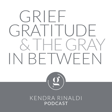
Caregiving and Transformation with Kimberly L. Byers
Kimberly Byers is the CEO of ByHers Peace of Mind, LLC. A company empowering clients to find PEACE in their over-burden lives! Ms. Kim is an Author, Transformational Speaker/Coach, and Mentor, who influences clients to find better ways to regain clarity and commitment to self-care! This 28-year Army Retired senior Non-Commissioned Officer has been interviewed by local radio stations on how she balances her busy life and still makes time for others. As a Senior Non-Commissioned Officer in the Army, she has had her share of dealing with crisis/trauma, including hurt, pain, and loss. All of this is why she focuses on adversity with her clients. Adversity can become challenging when you are unsure how to handle life's mishaps. My job is to show additional ways to get moving again in life, where you pull up, push out, and begin to live again.
Breakdown Synopsis for Show Notes In this episode, Kendra Rinaldi sits down with Kimberly Byers, the CEO of By Hers Peace of Mind LLC, to discuss her journey from grief to peace. Kimberly is a transformational speaker, coach, mentor, and author of the book "From Grief to Peace." Join us as we delve into:
- Introduction: Meet Kimberly Byers and learn about her diverse roles and achievements.
- Background: Kimberly shares her upbringing, family dynamics, and how her childhood shaped her journey.
- Personal Loss: The impact of losing her mother and brother, and how it transformed her life.
- Industry Insights: Kimberly talks about her company, By Hers Peace of Mind LLC, and how it helps clients find peace.
- Grief Journey: The seven steps that helped Kimberly navigate her grief and find peace, including seeking professional help, journaling, and understanding that it's okay to not be okay.
- Family Connections: Heartwarming stories of Kimberly's son feeling the presence of his grandmother and how they maintain a connection with her spirit.
- Transformation and Advice: How Kimberly's life has transformed since her mother's passing, and her advice for others experiencing grief.
Tune in to hear Kimberly Byers' inspiring story and discover the steps she took to transform her grief into peace.
Contact Kendra Rinaldi to be a guest on the podcast https://www.griefgratitudeandthegrayinbetween.com/book-online


